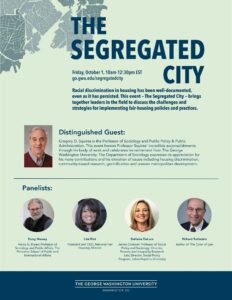A virtual talk by sociologist Greg Squires on the Segregated City
October 1, 2021
9:00-11:00 am (CST)
Greg Squires was part of the Urban Studies faculty from 1984-2000, when he left to go to George Washington University in Washington DC as chair. Greg really started and pursued almost half his academic career at UWM, coming from the U.S. Commission on Civil Rights, and he trained legions of UWM students. This panel discussion is in his honor prior to his retirement from George Washington.
How can we best prepare to fight racial discrimination in housing? Greg Squires has spent his career contributing to public and academic conversations about predatory lending, insurance redlining, and fair housing policy. On October 1, 9-11 am Central Time/10-12 am Eastern Time, we will gather via zoom to take stock of Greg’s work and to inspire the next steps in this ongoing battle. Please register here.
Our discussion on October 1 will feature leaders in the field of fair housing and segregation:
The guest of honor at this event, Gregory D. Squires, has literally written the book(s) on urban racial segregation. His The Fight for Fair Housing (2018, Routledge) brings together activists and scholars, as this event does, to imagine the future of fair housing. We invite the GW community and beyond to participate in a rousing and provocative discussion of where we go from here in the struggle to support vibrant, inclusive communities where the well-being of residents is valued and prioritized.
